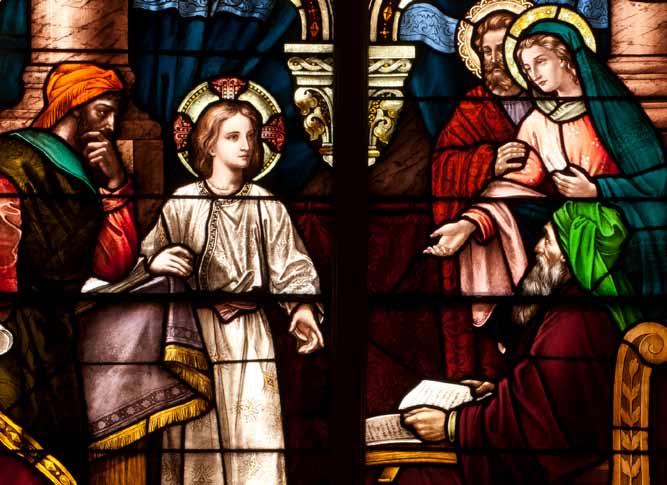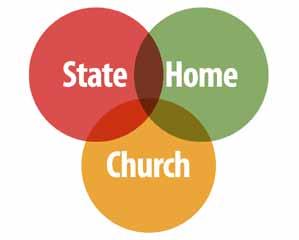
4 minute read
Catechism: Three Orders - Table of Duties
By Rev. William M. Cwirla
I remember when I was in high school. I couldn’t wait until I was in college. I thought life would be all fun and I could do whatever I wanted. But college classes were harder and more demanding, the workload was heavier, and the responsibilities were greater.
Advertisement
When I lived at home under the rule of my parents, I couldn’t wait until I was out of the house, on my own, and FREE. I thought I could do anything I pleased. But there were rent, food, clothes, and books to buy. Then a job, a family, a congregation. More responsibilities and duties. Two things I learned: You’re never without responsibilities. And you’re never out from under authority.
We’re going to spend some time now on The Table of Duties. It’s the eighth and last part of the Small Catechism and deals with responsibilities and authorities. This part probably wasn’t prepared by Luther, but was later taken up into the Small Catechism and became a part of it.

The Table of Duties is a collection of Scripture passages dealing with various aspects of our temporal life in this world under the categories of home, church, and state. These are the three realms or “orders” in which all of us, as baptized believers, live. We are born or adopted into a family and home. We are members of a congregation. We are citizens of a state.
It’s really all about the 4th commandment and the gift of “parents and other authorities.” God is a God of order (1 Corinthians 14:33) who sets everything in His creation in order and under His authority. Without order and authority, there would be only chaos and anarchy, which may sound like fun until you have to live in it. Just ask anyone who has lived in a country whose government has collapsed. Our old Adam needs to be kept in line.
In each order—home, church, state—there is office and authority which are God’s representatives under the 4th commandment.
In the home, husbands are the heads of their wives and their households, and fathers and mothers are over their children. This is not to boss them around and make their lives miserable but for their blessing and protection. Also included here are bosses and workers, since the original workplace was the home.
In the church, God has established that there are those who preach and those who hear: pastors and people. While every Christian is a priest in Christ’s royal priesthood, not all Christians are pastors. Priests are born in Baptism; ministers are made through call and ordination.
In the state or civil society, God has ordered things so that there are those who govern and those who are governed. In our country, we participate in the selection of those who govern, but ultimately they hold office in the government. This, too, is for our blessing and benefit, both to restrain the evils of sin and our sinful natures and for the promotion of the general good.
As baptized believers in Christ, we live at the intersection of all three orders in family, congregation, and society. This is where God has located us to serve our neighbor with His goodness and mercy. Each of us has a place and purpose in each of these orders. Lutherans call that “vocation,” or “calling.” Where God has placed you and gifted you defines your vocation, your calling—that is, the way in which you serve your neighbor, whether as a teacher, fireman, father, mother, pastor, plumber, etc.
Our old Adam hates order. He’s a natural-born anarchist who wants to be a god in place of God and doesn’t like to be told what to do. Our natural inclination when confronted with a “table of duties” is to let out a big sigh, give an eye roll and say, “Do I have to?” And the answer from God is, “Yes, you have to! Repent!” Of course, this ultimately kills the old Adam, which is precisely what the Law is supposed to do. But in the meantime, it forces the old Anarchist to get with the program and keeps him in line.

“The Word became Flesh and dwelt among us” (John 1:14). And in dwelling among us, Jesus came into all three of these orders and lived under their authority. He was obedient to His earthly parents, Mary and Joseph (Luke 2:51). As a boy, He sat at the feet of the teachers of the synagogue and the temple (Luke 2:46). He was subject to the religious and civil governments of His day—the same authorities who would eventually sentence Him to death and crucify Him. Jesus did the Table of Duties to His death for you.
You do them, too. They are your duties and responsibilities, the holy orders of your priesthood. You do them not to earn God’s favor or reward. Christ has already done all that for you. You do them to offer your bodies as a living thank offering to God (Romans 12:1) in loving service of the people God put around you: your family, your community, your congregation. God is “hiddenly” working through you to do His goodness and mercy to those around you. You have a vocation, a calling.
At the moment, you are exploring and discovering how God has gifted you. You’re learning in classroom and laboratory. You’re developing skills and honing talents and testing your abilities. You’re apprenticing adults, preparing to take up adult-sized responsibilities and authorities. You’re preparing to be husbands and wives, fathers and mothers, workers and citizens, members of congregations. Priestly servants.
There isn’t any secret plan for your life in the mind of God. There’s no waiting for God to reveal some special “plan” He has in mind for you. He’s left you free to design one for yourself. How will you thank God for His saving you in His Son? How will you serve those around you in the love of Christ? The Table of Duties will be your guide.
Rev. William M. Cwirla is the pastor of Holy Trinity Lutheran Church in Hacienda Heights, California.









